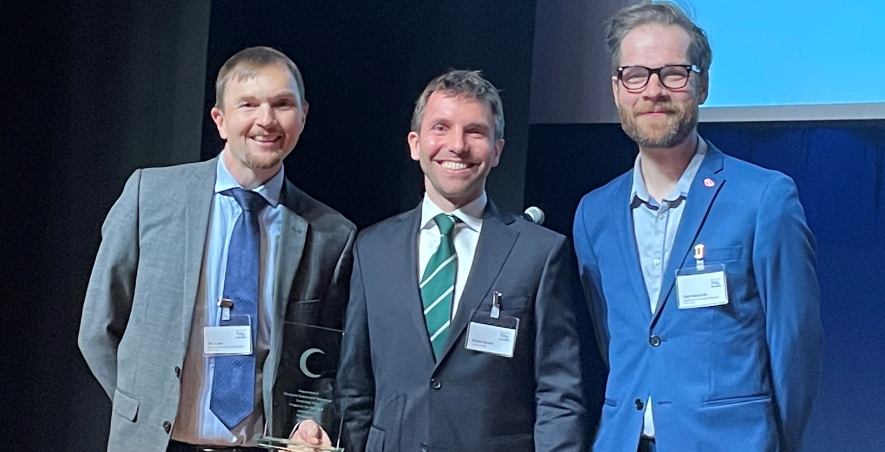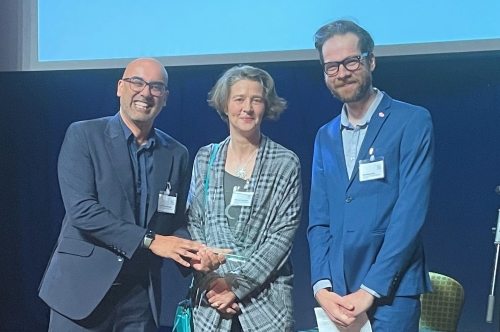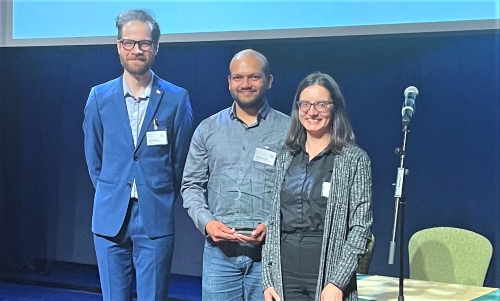Main image
Dmitry Kazhdan (left) and Botty Dimanov (centre) receiving the 2022 Company of the Year award for Tenyks from Dr Carl Henrik Ek.
Department of Computer Science and Technology

Submitted by Rachel Gardner on Thu, 20/04/2023 - 19:30
The Hall of Fame is the group of companies set up by students, staff and alumni of this Department – and there are now over 320 of them. "We are very proud of this," says Ben Karniely, coordinator of our alumni association, the Cambridge Ring. "It is an indication of the impact that our Department has on the computing industry and the world of technology."
Company of the Year 2022: Tenyks
Tenyks is a spin-out from this Department that aims, as its founders say, 'to invent the way humanity interacts with AI'. It is focused on helping machine learning engineers build better, safer artificial intelligence. Tenyks' platform helps developers understand what’s wrong with their algorithms, resolve issues, remove bias, boost model performance, and enhance data quality. It went through the YCombinator Summer Programme in 2021 and last year announced it had raised $3.4 million in seed funding.
The company was co-founded by former PhD student Botty Dimanov and current PhD students Dmitry Kazhdan and Maleakhi Wijaya – all of whom were recently named in the Forbes '30 Under 30' Europe Class of 2023 list. Tenyks has developed technology that provides insights for computer vision applications at an unprecedented granularity. Botty came up with a patent-pending invention that laid the foundations for Tenyks' technology while working on his PhD here in the Department with Prof Mateja Jamnik. Dmitry and Maleakhi then spent two and a half years fleshing out the practical implications of the research as part of their PhD and Masters work and establishing the engineering scaffolding that could produce a reliable product.
Product of the Year 2022: Flower
 Another YCombinator company, Flower Labs describes Flower as ‘a Friendly Federated Learning Framework’. It enables machine learning on distributed data by moving the training to the data, instead of moving the data to the training. Flower offers a unified approach to federated learning, analytics, and evaluation and the opportunity to federate any workload, any ML framework, and any programming language. The company was co-created by Nic Lane (left), Professor of Machine Learning Systems here, along with his former PhD student and current Visiting Researcher Daniel Beutel, and fellow current Visiting Researcher Taner Topal.
Another YCombinator company, Flower Labs describes Flower as ‘a Friendly Federated Learning Framework’. It enables machine learning on distributed data by moving the training to the data, instead of moving the data to the training. Flower offers a unified approach to federated learning, analytics, and evaluation and the opportunity to federate any workload, any ML framework, and any programming language. The company was co-created by Nic Lane (left), Professor of Machine Learning Systems here, along with his former PhD student and current Visiting Researcher Daniel Beutel, and fellow current Visiting Researcher Taner Topal.
More than three years ago, the co-founders built Flower to start to create the necessary conditions for AI to evolve with core collaborative principles and with data allowed to remain in its natural state: distributed and under control by those who generate it. Its approach is community-first and open-source. It has evolved to become an easy way for someone to take a centralized machine learning method, and allow it to become federated.
Flower is now being used by universities including Cambridge, Oxford, Harvard, MIT, and the Technical University of Munich, and organisations including Brave, Orange, Samsung, Siemens and Accenture, among others.
Above left: Prof Nic Lane (left) and Daniel Beutel (centre) receiving the Product of the Year award for Flower from Dr Carl Henrik Ek.
Better Future Award 2022: The Cambridge Centre for Carbon Credits (4C)
 The Cambridge Centre for Carbon Credits (4C) was launched in early November 2021 as an interdisciplinary collaboration between this Department (Computer Science) and the Departments of Plant Sciences and Zoology. The Centre's first goal is to scale up the supply of deforestation-avoidance carbon credits in order to halt tropical deforestation as soon as possible. The Centre is currently working on a prototype of a trusted nature-based marketplace.
The Cambridge Centre for Carbon Credits (4C) was launched in early November 2021 as an interdisciplinary collaboration between this Department (Computer Science) and the Departments of Plant Sciences and Zoology. The Centre's first goal is to scale up the supply of deforestation-avoidance carbon credits in order to halt tropical deforestation as soon as possible. The Centre is currently working on a prototype of a trusted nature-based marketplace.
As co-founders Anil Madhavapeddy (Professor of Planetary Computing) and Srinivasan Keshav (Robert Sansom Professor of Computer Science, right) say: “The world is facing simultaneous biodiversity and climate crises. Pressure is mounting from governments and the general public to rapidly roll out a global programme of well-executed nature-based solutions to sequester several giga-tons of carbon each year and protect biodiversity. Over 100 world leaders at COP26 pledged to end deforestation by 2030. Our urgent challenge is figuring out how to verify that deforestation solutions are working, and tracking the associated carbon credits used to offset necessary emissions."
The Centre is creating digital tools and a trusted, decentralized platform to help purchasers of carbon credits to confidently and directly fund trusted deforestation avoidance projects, bringing together corporate funders and conservationists via automated and transparent smart contracting tools.
Above right: Prof Anil Madhavapeddy and Eleanor Toye Scott receive the Better Future Award for the Cambridge Centre for Carbon Credits.
 Publication of the Year 2022: Machine Learning Detects Altered Spatial Navigation Features in Outdoor Behaviour of Alzheimer’s Disease Patients (Abhirup Ghosh, Vaisakh Puthusseryppady, Dennis Chan, Cecilia Mascolo, Michael Hornberger)
Publication of the Year 2022: Machine Learning Detects Altered Spatial Navigation Features in Outdoor Behaviour of Alzheimer’s Disease Patients (Abhirup Ghosh, Vaisakh Puthusseryppady, Dennis Chan, Cecilia Mascolo, Michael Hornberger)
This paper was a collaboration between members of this Department (Research Associate Abhirup Ghosh and Cecilia Mascolo, left, Professor of Mobile Systems) and colleagues at the Norwich Medical School, University of East Anglia and the Institute of Cognitive Neuroscience, University College London. Impaired navigation is one of the earliest symptoms of Alzheimer’s disease, but rather than studying patients’ real life behaviour, the authors pointed out that studies to date have instead involved proxy tests of navigation. They set out to address this by investigating if it's possible to identify Alzheimer’s patients by using GPS tracking to see how they navigate their way round their local area.
Their results highlighted that real-world navigation patterns could indeed be used as a valid behavioural marker for Alzheimer’s disease. The researchers also suggested applying their approach to studying navigational data from patients with less advanced Alzheimer’s to see if it could be used to detect dementia earlier. Their work will also inform future studies in patients with Alzheimer’s who are at risk of getting lost and they say it could also lead to the development of algorithms based on real-world GPS data to calculate the risk factors for dementia patients getting lost.
Above left: Research Associate Abhirup Ghosh and Cecilia Mascolo, Professor of Mobile Systems, receiving the Publication of the Year award 2022.